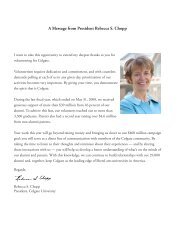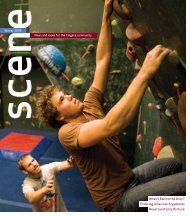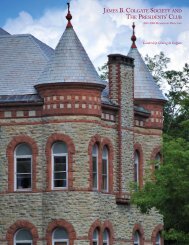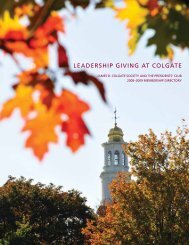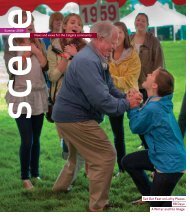101 Things To Do Before You Graduate Living In History ... - Alumni
101 Things To Do Before You Graduate Living In History ... - Alumni
101 Things To Do Before You Graduate Living In History ... - Alumni
Create successful ePaper yourself
Turn your PDF publications into a flip-book with our unique Google optimized e-Paper software.
Diary From Haiti<br />
By Sophie Paris ’97<br />
I<br />
was standing on 50th and First when the faint<br />
ring of my cell phone reached my ears through<br />
the din of Manhattan traffic. It was a corner I<br />
know well, from my years of coming and going<br />
into the photo unit on the ninth floor of the United<br />
Nations.<br />
I was heading to the UN offices to meet and<br />
shoot the secretary general, one of the many kinds<br />
of assignments on my docket. I was running late, but<br />
juggled my heavy bag of camera bodies and lenses<br />
as I considered whether to answer my phone. It was<br />
my father — an odd time for him to call.<br />
“Where are you?” he asked.<br />
“On my way to a shoot; why, what’s wrong?”<br />
“It’s all over the news. Haiti’s had a terrible earthquake.<br />
I don’t want to alarm you, but it sounds bad.”<br />
He didn’t have to say more for me to realize the<br />
harsh implications. During my eight years of working<br />
my way up from darkroom assistant to staff<br />
photographer, I’d spent two-and-a-half of them<br />
documenting MINUSTAH, the UN’s mission to bring<br />
security, reduce political turmoil, and facilitate elections<br />
in Haiti. I had lived on the island, crisscrossing<br />
its mountains, learning Creole and French, and falling<br />
in love with its kind, spirited people. That assignment<br />
had ended three years ago, but of the 300 UN<br />
civilian staff still in Port au Prince [PAP], I knew half<br />
of them well. A dozen remained close friends. I heard<br />
myself exhale as my head became crowded with<br />
questions. But of one thing I was certain: I had to get<br />
to Haiti.<br />
The following entries are excerpted from my<br />
notes and e-mails about the journey that ensued.<br />
Clockwise, from top: A young boy tries to break through the<br />
rubble of his home in the Haitian slum of Nerette.<br />
Workers in the U.N. Development Programme’s Cash<br />
for Work program line up to receive payment at the Sant<br />
Triyaj Fatra in the Kafoufey neighborhood of Port-au-<br />
Prince. Every 15 days, a new batch of 1,500 people is hired;<br />
with a 6,000-person wait list for street cleaner jobs, they<br />
cannot work for the program again. Each is paid a little over<br />
minimum wage, 180 Haitian Gourdes per day.<br />
Mourning the loss of more than 230,000 people, a<br />
commemoration of the one-month anniversary of the<br />
earthquake began with prayer services throughout<br />
Port-au-Prince. On Champs de Mars, thousands of people<br />
crowded around the square, dancing and singing their<br />
prayers, led by a preacher over a loudspeaker.<br />
Nearby, a boy prayed in front of the collapsed National<br />
Palace.<br />
1/12/10<br />
New York City<br />
A confounding, dark blur of updates arrives hour by<br />
hour: A 7.0 earthquake has ripped across the capital<br />
city of Haiti. Seventy percent of the buildings are<br />
in rubble. Scarce gasoline and food supplies are<br />
now gone. The airport is damaged and shut down.<br />
Churches, schools, hospitals — even the maximum<br />
security prison — are badly damaged. Looting is getting<br />
out of control. A million people are homeless; up<br />
to 200,000 are trapped inside buildings or have been<br />
crushed to death. Late into the night, I hover over<br />
a small television with my coworkers. No one asks<br />
the cutting question out loud, but it gnaws at our<br />
silence. What about the UN headquarters, housed in<br />
the relatively modern and sturdy Christopher Hotel?<br />
Did our colleagues survive? Then, at close to midnight,<br />
CNN breaks the news. The UN headquarters<br />
had collapsed at 4:56 p.m., while the building was<br />
humming with staff. It is simply too hard to accept,<br />
too hard to comprehend. <strong>Before</strong> I go to bed, I write<br />
an e-mail:<br />
Dearest Family – As you all have heard, there has<br />
been a massive earthquake in Haiti. Thank God most<br />
of my friends have been accounted for (Gille’s fam,<br />
Gaelle, Cyril, Logan, and many others); however,<br />
many of my colleagues are unaccounted for … Just<br />
spoke to Logan, the UN photog who replaced me,<br />
and it is really bad … a lot of people evacuated the<br />
UNHQ building before it crumbled, but a lot were<br />
still in it. … I am literally begging my boss to send me<br />
down there to cover the situation …<br />
Trying to get in with OCHA, the UN’s emergency<br />
management arm … I have two friends from the<br />
graduate program I attended last year at the <strong>In</strong>ternational<br />
Center of Photography who are going, so we<br />
decided that we would go together … Most journalists<br />
I know left tonight for Santo <strong>Do</strong>mingo to get<br />
into PAP by dawn. Amazingly, Getty called me and<br />
asked me for contacts/fixers etc. in PAP. Just makes<br />
me want to get there that much more… xoxooxoxox<br />
1/13/10<br />
I have 12 hours to rearrange my life — convince the<br />
UN that they have to send me. I argue that I know<br />
the city and country well, speak the languages,<br />
and, as a photographer and photo editor, know the<br />
demands of working in dangerous situations among<br />
people in crisis. I’ve survived muggings, gun fights,<br />
robberies, and a few bouts of malaria. <strong>In</strong> the process,<br />
I’ve taken my emotional hits and have seen my share<br />
of death and decimation, but it’s also taught me my<br />
limits — how to get through it and keep going.<br />
For the next 36 hours, when not lobbying for my<br />
departure, I establish a relay from a computer on a<br />
military desk in Haiti. Logan Abassi and our second<br />
UN photographer, Marco <strong>Do</strong>rmino, will send me<br />
their images via satellite in New York. Logan tells me<br />
that he’d been inside the entrance of the UN headquarters<br />
when the terrible cracking and shaking<br />
began. With only a camera bag on his shoulder, he<br />
leapt outside and was among the last to escape. He<br />
tells me about trying to pull others out of the towering<br />
stacks of concrete before his instincts to just go<br />
shoot take over…He tells me that he traveled by foot<br />
and whatever means he could along the decimated<br />
streets of the city to his apartment at the Montana<br />
Hotel, but found nothing but wreckage. Marco<br />
and Logan are on an adrenaline-fueled odyssey of<br />
shooting without food or sleep. I stay up with them,<br />
editing and feeding their images of the first hours of<br />
the tragedy to the best publications in the world.<br />
1/15/10<br />
It is clear to me that Logan and Marco will soon<br />
collapse from exhaustion and the psychic toll of living<br />
through so much tragedy. David Wimhurst, the<br />
chief of the public information office in Haiti, has<br />
sent an urgent request to UNHQ for me to be sent<br />
as soon as possible. <strong>To</strong>gether, we’ve been lobbying<br />
every bigwig involved. Unsure if it will be approved,<br />
I pack my duffel bag anyway with the essentials to<br />
survive what could be an indefinite ordeal: mosquito<br />
repellent, lighters, batteries, medicines (especially<br />
to avoid malaria, dysentery, and dehydration), knife,<br />
soap, precious toilet paper, sleeping bag, and my<br />
well-used but dependable hiking boots that will let<br />
me walk through blood, excrement, and mud. I add<br />
to that my requisite iPod, two novels, a few candles,<br />
my Powerbook, and as much photo equipment as I<br />
can carry. Last but not least, I throw in a corkscrew. I<br />
haven’t forgotten my Colgate roots. But I wonder if<br />
I’ll ever taste another bottle of wine.<br />
1/16/10<br />
At last, it’s happening. I’m leaving for Haiti tomorrow.<br />
I show up at UN headquarters at 5:00 a.m. and<br />
join Secretary-General Ban Ki-moon’s carpool to JFK.<br />
How did this happen? I wouldn’t hear “no.” Maybe<br />
everyone got tired of fighting me. I hope I wasn’t<br />
obnoxious. But it worked, and I am keyed up and<br />
frightened beyond belief to reach Haitian soil.<br />
1/17/10<br />
Sent from temporary UN headquarters, end of the<br />
runway, PAP airport<br />
Dearest Fam– It’s a total hellhole here and we might<br />
as well be at war in terms of sleeping arrangements.<br />
Nowhere to even pitch a tent! … I’m fine though, just<br />
hot, mosquitoes everywhere, lots of dirt and dust<br />
and people who are miserable. My UN colleagues<br />
are NOT ok, I repeat they should all be evacuated and<br />
new staff flown in. They pulled two guys out of the<br />
UN building today, one of them while the SG was<br />
here so shot that. So exhausted I will sleep fine on a<br />
floor, have my mat and sleeping bag. Nighty night<br />
and will give you much more of an update tomorrow.<br />
LOVE YOU ALL! xoxoxoox<br />
News and views for the Colgate community<br />
37



